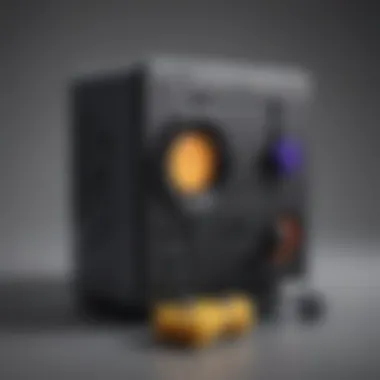Exploring the Evolution of the Modified GameCube


Intro
The modified GameCube represents a fusion of nostalgia and innovation. Originally released by Nintendo in 2001, the GameCube has seen immense popularity among gamers. Modifications have since breathed new life into this classic console. This exploration focuses on the intricacies of these modifications and examines their significance in today’s gaming culture.
Through an in-depth analysis, we will journey into the enhancements and customizations that players often pursue. Our aim is not just to examine the hardware or software changes. We will also explore the broader implications these modifications create for users and the gaming community as a whole.
Game Reviews
Overview
A notable aspect of the modified GameCube is its influence on the way players interact with classic titles. Many enthusiasts see further potential where the original hardware limits access to more games. In combination with modifications, users enhance game catalogs beyond Nintendo’s offerings, promoting a richer experience.
Gameplay
The gameplay remains rich and engaging, but modifications often introduce features like improved control responsiveness and faster load times. Users can now savor their favorite titles with modifications that cater to personal preferences. This redefined gameplay experience helps cultivate a deeper bond with the games.
Storyline
While mods do not typically alter the core narratives, they can broaden storytelling access. Expanded formats and hacks may introduce fan-created content. These creative attempts redefine how players engage with narratives present in games.
Graphics
Modifications have also evolved visual fidelity. Whether it involves increased resolution, anti-aliasing, or texture packs, users now see classic games transformed into visually stunning experiences, increasing their appeal.
Soundtrack
Some modifications commit time and effort to revamp the acoustic elements. Fans create superb remixes or enhance audio clarity which contributes to a more immersive gaming environment.
Pros & Cons
Pros:
- Increased game variety through compatibility with additional titles
- Custom usability enhancements for a personalized experience
- A revitalized visual and auditory landscape for nostalgic titles
Cons:
- Potential voiding of warranties when hardware modified
- Legaland ethical considerations concerning game ownership and distribution don't always have clear solutions
- Risk of simply not getting the expected performance from unofficial modifications
Final Verdict
Modified GameCube presents a layered realm through nostalgia and enhanced access to games. However, it originates from a complex mix of personal aspirations and ethical inquiries into what modifications mean for the future of gaming.
Overall, the exploration of modified GameCube is intricate. It fuses hardware and community desires that remain relevant in the constantly changing video game environment.
Intro to the Modified GameCube
The world of gaming has evolved significantly, yet the GameCube remains a touchstone in this transformation. Its innovative design and gameplay continue to influence the landscape. The introduction of modifications has allowed this well-regarded console to evolve further. This section will delve into the significance of the modified GameCube within the broader context of gaming culture and technology.
Understanding the GameCube's Legacy
The GameCube holds an essential place in gaming history. Released in 2001, the console offered unique gameplay experiences and a distinct approach to multiplayer usage. Titles such as Super Smash Bros. Melee and The Legend of Zelda: The Wind Waker left a lasting impression on enthusiasts. These games highlight the console's ability to deliver innovative mechanics and memorable storytelling. Over time, the GameCube became a beloved device among dedicated fans.
Its reputation established a solid groundwork for the development of modifications aimed at enhancing the overall experience. Enthusiasts recognized the potential of such alterations, leading to innovations spanning hardware and software categories. This legacy of creativity continues, allowing users to explore uncharted territories with the modified GameCube.
The Rise of Console Modifications
The trend of console modifications has gained significant traction in the gaming community. As technology advanced, players sought to enhance their experiences, spurring creativity and technical skills among gamers. Modifications introduce features not initially intended by manufacturers and can expand the useful life of older hardware.
Several factors have contributed to this rise:
- The desire for enhanced gaming experiences
- The nostalgia associated with older consoles
- The willingness of the community to share knowledge and resources


Console modifications can enrich the gaming environment. Many see it as a natural progression in leveraging technology for personal preferences. The growing awareness of the technical aspects involved has left an indelible mark on the culture of gaming.
Through this backdrop, the modified GameCube emerges not just as a nostalgic device but as a pivotal argument in advancing how we perceive legacy consoles. As enthusiasm continues for GameCube enhancements, fascination with understanding their implications remains as crucial as ever.
Technical Aspects of Modification
The technical aspects of modifying a GameCube play a critical role in how this vintage console can be adapted to suit modern gaming needs. Understanding these components is essential for anyone interested in enhancing gameplay, expanding libraries, or preserving the legacy of gaming. The modifications can be classified mainly into hardware upgrades and software enhancements, each serving different purposes while offering substantial improvements.
Common Hardware Modifications
Memory Upgrades
Memory upgrades focus on enhancing the internal memory of the GameCube. Gamers often seek these modifications to improve loading times and enhance overall performance. The key characteristic here is the ability to increase RAM size, which facilitates the handling of larger files and more complex applications alike. This is particularly beneficial because it opens doors to advanced emulation capabilities and running games that were previously unplayable or faced performance issues.
A unique feature of memory upgrades is their relatively straightforward application process. However, some disadvantages include the potential voiding of warranties and risks associated with delicate hardware handling. Thus, those with limited experience may exercise caution.
Custom Cooling Solutions
Custom cooling solutions are essential when modifying gaming machines like the GameCube, particularly if performance enhancements lead to increased heat generation. Enthusiasts often replace stock cooling fans with upgraded models or add heat sinks to ensure optimal thermal management. This level of customization helps in extending the console's lifespan and maintaining stable performance levels.
The primary advantage of these custom solutions is reduced heat, leading to better reliability during extended gaming sessions. However, there might be challenges such as increased noise levels and complexity in installation, especially if not all components are compatible.
Disk Drive Alterations
Disk drive alterations provide another means of improving the GameCube experience. Depending on the goals, options might range from replacing the existing drive with a more efficient model to utilizing digital storage alternatives like SD card interfaces. The main characteristic of these alterations is the potential to improve load times significantly while increasing the storage capacity for games and data.
These modifications can vastly expand access to digital gaming libraries, making it easier for users to utilize game backups or homebrew applications. On the flip side, risks include compatibility issues and possible data loss during transfers if not executed correctly.
Software Enhancements
Emulation Capabilities
Emulation capabilities opened new avenues for retro gaming enthusiasts. By modifying the GameCube to support emulators, users can approach a broader aspect of gaming beyond the console's intended library. This essential feature allows players to experience not just GameCube classics but also myriads of titles from older consoles like NES and SNES.
A significant benefit of this capability is diversification; you can enjoy multiple gaming systems via a single device, consolidating many consoles' classic titles. However, it must be acknowledged that relying on emulation often scales poorly in terms of performance regarding graphic fidelity and playability compared to original hardware.
Custom Operating Systems
Custom operating systems offer a compelling way to enhance user experience further. These modified OS can come with various user-friendly features designed specifically for enhancing gaming experiences drastically. Overall, they can also allow more flexibility in running different game formats and better customization of system settings to those with specific needs. Moreover, the objective of these changes generally revolves around streamlining the interface for convenience and accessibility.
However, installation of custom operating systems can be a daunting task for those unfamiliar with the process. Some new users may find it daunting to navigate non-standard menus due to limited resources that support their specific versions.
Homebrew Game Development
Homebrew game development encourages creativity within the gaming community. It enables passionate developers to create games and applications specifically designed for the GameCube. This engagement fosters a sense of community, while offering players newly crafted content that otherwise wouldn't be available.
The versatility of the GameCube becomes enhanced, allowing for releases that can cater to niche interests in gaming. Nonetheless, challenges exist regarding a lack of official support for these projects. Players may need extra technical skills to get these homebrew titles up and running efficiently.
The fusion of hardware modifications and software enhancements significantly revamps the GameCube, positioning it uniquely in modern entertainment.
Reinventing a classic console through the lens of technical modifications provides an engaging opportunity not just for gamers but for the entire gaming ecosystemーblending nostalgia with contemporary dynamics.
Benefits of Modifying the GameCube
Modifying a GameCube opens up possibilities that reach far beyond the original design. These alterations can greatly enhance the gameplay experience, allow access to a broader selection of games, and even contribute to preserving a vital slice of gaming history. Understanding these benefits can provide clarity not only about the implications for individual users but also on how they shape the gaming culture as a whole.
Access to a Broader Game Library
One of the most remarkable advantages of modifying the GameCube is the access it creates to an expanded library of games. Standard GameCube consoles are limited to their original lineup. However, gamers who modify their consoles can enjoy a wide range of games, beyond what Nintendo initially offered. This includes:
- Imports: Many titles never made it to the North American or European markets. Modifications allow users to play these foreign games effortlessly.
- Emulators: Enhanced version of the GameCube can run emulators for various other systems. Players can access obsolete or lesser-known games from platforms like the NES, SNES, or even the Sega Genesis.
- Homebrew: Interested developers can explore creating their own games or modifications thanks to the support for homebrew software. Players can then experience unique, user-generated content that is often overlooked.


The increased game selection not only rejuvenates interest in the GameCube but also encourages gamers to explore titles that they might never have otherwise encountered.
Enhanced User Experience
Enhancements resulting from modifications can significantly improve the overall user experience of the GameCube. Several alterations lead to positive outcomes:
- Graphics and Performance: Many modifications facilitate improved graphics rendering and system performance. Upgraded graphics can rejuvenate older games, making them more visually appealing.
- Storage Solutions: Adding bigger storage solutions can help ease frustrations linked with limited space. It lets players install multiple games or having better load times with saved data.
- Custom Controllers: Many users switch to superior custom controllers. These may have better ergonomics or additional features such as turbo buttons learned from experience of gaming in modern competition.
The changes elevate the gaming experience considerably. Users find greater satisfaction through features that cater specifically to their gaming style and preferences.
Preservation of Gaming History
The modifications to the GameCube can have positive effects on the preservation of gaming history. Consolenes naturally become obsolete over time, yet modding breathes new life into older hardware. Modifying the GameCube involves:
- Archiving Legacy Software: Many of the games from the GameCube are at risk of becoming lost to time. Emulation preserves these titles, ensuring they remain playable for an audience who climb back to these experiences.
- Revitalize Community Interest: When existing games are modified or looked at in a new context, they can spark interest among both old fans and newer generations. Replicating or reviving lost experiences engages communities and generates spirited discussions.
- Innovation and Experimentation: Users are not limited to accept whatever would commonly stand alone. They dive into previous game designs, exploring and learning a lot about varying game theories.
It goes beyond just cherishing the console. Modifying benefits the entire gaming landscape, facilitating a connection to history for future gaming enthusiasts.
Modifications are revolutionary for gaming culture. They preserve our history and through enhancements, lead us into the future.
Legal and Ethical Considerations
Modifying consoles like the GameCube can open up new experiences and opportunities for gamers, yet it stirs a pot of complex legal and ethical issues. Understanding these considerations allows enthusiasts to navigate their passion responsibly while maintaining respect for the gaming community and its origins.
Understanding Copyright and Fair Use
Copyright laws are often considered a minefield in the world of video game modifications. The core principle of copyright is to protect the intellectual property rights of creators, ensuring that they are compensated for their work. When it comes to consoles like the GameCube, the software and firmware falls under these laws.
Some modifications, especially those using custom firmware or BIOS files, can tiptoe the line of what is legally acceptable. However, the concept of fair use does introduce some leeways; specifically, it allows for certain uses of copyrighted material for commentary, criticism, and educational purposes. For example, creating mods that involve gameplay elements or textures can be argued as transformative, thus falling under this umbrella.
On the other hand, downloading or distributing copies of games that one does not own remains distinctly outside fair use. Users must remain vigilant about which aspects of their modifications correspond with these regulations to avoid potential legal repercussions.
Risks Involved in Modifying Hardware
Altering hardware does not come without inherent risks. Players drawn to the allure of a modded GameCube must heed various consequences. For instance, one common mod involves installing larger hard drives or custom cooling systems. While exciting, such modifications could void warranties still in effect or even cause irreparable damage to the console.
Other risks could stem from poor execution of hardware modifications. This may include soldering errors or component misplacement. Improper installation might lead to system failures, rendering the console entirely inoperable.
Raymond, an avid modding enthusiast, once stated, > "I noticed my GameCube acting up post-mod. Realized I soldered pins incorrectly. A tough lesson learned!"
Thus, the word of caution rings true—modification requires a degree of technical skill and understanding. Potential modders should evaluate their ability and knowledge before diving into alterations.
Community Standards and Expectations
The gaming community heavily influences the perception and practice of modifications. Without cooperation and mutual respect, modding risks becoming a destructive force rather than a creative outlet. Within this realm, users often follow certain community standards that govern acceptable activities.
Engaging in mods and sharing experiences should concentrate on upholding gaming aud integrity. This means honoring original creators, utilizing genuine copies of games, and contributing positively to the cultural landscape.
- Elements of community standards include:
- Collaboration and sharing of knowledge.
- Addressing piracy and respecting developer intentions.
- Encouraging ethical modding practices.
Navigating the intricate landscape of legality and ethics hinges on awareness and consideration for fellow gamers. Adhering to these norms fosters collaborative creativity while ensuring that modifications serve a respectful, sustainable purpose in the gaming world.
Comparing Modified GameCubes to Other Consoles
The exploration of modified GameCubes is situated within a broader narrative of console modding in general. When discussing modifications, it is essential to consider how the GameCube stands relative to its contemporaries like the PlayStation and Xbox, as well as the newer paradigm of PC emulation. Each platform brings unique modding cultures and practices, contributing to a diverse gaming ecosystem. Understanding these differences is essential for gamers and enthusiasts who navigate the mods landscape.
The PlayStation: Modding Culture and Practices
PlayStation consoles have a storied history of modifications. From the early days of the original PlayStation to the more advanced PlayStation 5, modding is a significant part of the community's fabric. Here are some aspects of that culture:


Wide Range of Modchips: Many PlayStation consoles benefit from modchips, which enable functionalities like playing backup copies and region-free games.
Homebrew: The community promotes homebrew organization on several versions. PlayStation 3 and PlayStation Vita, both introduce software installations for experience.
This varied culture offers users access to many games outside conventional store offerings, contributing richness to gaming experiences. While GameCube modifications focus leon heavier on hardware tweaking, PlayStation players are inclined toward software and firmware alterations.
Xbox Modifications: A Different Landscape
The Xbox platform presents another interesting modding landscape. When examined, several distinctions become clear:
Softmodding vs Hardmodding: Xbox users often experience two main modding approaches, making this console differ somehow from the GameCube community. Softmodding allows activations via the dashboard, while hardmodding involves hardware alterations for deeper control.
Multi-Functionality: Xbox modifications routinely expand console functionality including emulators for various systems. Additionally, the Xbox Live service created an environment for players to connect and communicate.
Compared to the GameCube, the Xbox's community tends to capitalize on creating a system that blurs the lines between console and PC, pursuing complex applications through mods, shaping user experience diversely.
PC Emulation Versus Console Modding
Turning to PC emulation highlights even more contrast than those we see across console varieties. Here are key comparisons:
Versatility and Access: PCs provide much broader access to numerous emulation platforms unlike anything available permanently confined to the GameCube.
Customization: Game tuning and enhancements are customizable, meaning powerful GPUs can render past console's games in superior quality versus traditional consoles upgrading via standard hardware offerings.
While some players find community modding of GameCube consoles gratifying, others prefer the flexibility emulation on PCs provides. Evaluation here depends significantly on preferences between owning original hardware and leveraging the potential of modern capabilities patently.
"Understanding these differences offers profound insight into gamers' influences on modding trends and practices. Knowledge of how systems diverge shapes one’s approach to constructing a customized gaming landscape."
Recognizing the variations between consoles ultimately relates back to the desires and expectations of gamers. Modified GameCubes sit within these evolving views, embodying trends in gaming ambition pervasive within console comparisons.
The Future of Modified GameCubes
The future of modified GameCubes holds significant relevance for the gaming community, especially as technology continues to advance. As gamers explore options to customize their consoles, new trends and collaborative efforts will shape the trajectory of the modified GameCube. Understanding these prospects can enhance user experiences, ensuring that the unique potential of this classic console is not only preserved but also expanded.
Anticipated Trends and Technologies
Several key trends are expected to emerge in the near future as the community pushes the boundaries of the GameCube’s capabilities.
- Increased Emulation Graphics and Speed: Advances in emulator technology are allowing GameCube games to run with improving performance and enhanced visuals.
- Cross-Platform Solutions: Developers might create tools that allow smooth gameplay of GameCube titles across various platforms, promoting accessibility.
- Cheaper Hardware Options: The cost of components for modifications is set to decrease, making it accessible for more users to enhance their consoles.
- User-Friendly Interfaces: As software becomes more intuitive, novice users will also feel comfortable diving into the realm of modding.
- Trend towards Hybrid Consoles: There may be a rise in hybrid devices, merging retro gaming with modern technologies. This trend is visible in other areas as well, assuring that the GameCube can stay relevant.
As each of these advancements unfolds, modifying the GameCube will likely represent a more powerful and user-oriented experience.
The Role of Community and Collaboration
The GameCube modding scene relies heavily on community collaboration, facilitating shared knowledge and guidance.
- Open Source Tools: Many modification tools are oriented as open source, allowing programmers to improve upon others' work and innovate new solutions.
- Online Forums: Platforms such as Reddit allow users to exchange ideas, ask advice, and showcase achievements. This vibrant exchange aids in spreading awareness around unique modifications.
- Dedicated Discord Servers: These spaces foster real-time collaboration, providing a venue for discussions about troubleshooting and enhancing insights into modding.
- Workshops and Events: Modified GameCube gatherings may arise, where enthusiasts can meet to share knowledge and skills, expanding their understanding of both hardware and software capabilities.
In perspective: The synergy of user collaboration—be it in online forums or in-person meet-ups—plays a vital role in ensuring that the future of modified GameCubes is as bright as possible, fostering a robust and innovative community.
Epilogue
In this article, we have explored the intriguing world of the modified GameCube. This final section seeks to highlight essential elements surrounding the modifications and reflect on their significance.
Summarizing Key Findings
The importance of modding the GameCube cannot be understated. Key points addressed throughout the article include:
- Hardware Enhancements: Modifications such as memory upgrades have significantly improved the performance and efficiency of the GameCube.
- Software Expansions: Enhanced emulation capabilities have broadened access to games from various platforms.
- User Experience Improvement: Users largely benefit from a more robust and widely available game library, elevating their gaming engagement.
- Legal Considerations: Insights into the ethical implications shed light on how modifications interact with copyright laws and community standards.
These findings establish that modifications do not only enhance the gaming experience, but also influence the gaming culture positively.
Final Thoughts on Modifications
Modifications to the GameCube create opportunities and roles for new communities. Whether it be casual gamers or passionate developers, engaging with modified systems contributes to a diverse and dynamic landscape. However, it is critical to approach modifications with understanding and caution.
Preservation and progression within gaming can coexist, but respect for the original creators and their works needs to remain. Balancing creativity with respect to legal frameworks will determine the future interactions within the gaming community.
The ongoing evolution of modified GameCubes reflects the dedication of enthusiasts who continually seek to push boundaries, and in many ways ensures that the nostalgic value of the GameCube will endure into the future.



